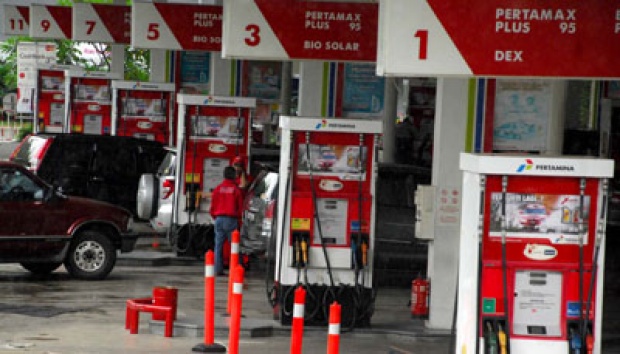
TEMPO.CO, Jakarta - The government should be open when it comes to subsidized Premium gasoline. If the government is not yet prepared to leave fuel prices to the market, the cost of subsidies must be officially included in the State Budget. Conversely, if the government really wishes to end subsidies, Pertamina should not be burdened with the obligation to supply Premium at low prices.
The ambiguous attitude has come under the spotlight after President Joko Widodo asked Pertamina last week to once again sell Premium in Java, Madura and Bali because of short supplies in these regions. Deputy Minister of Energy and Mineral Resources Arcandra Tahar immediately approved the Presidents instruction and assured that changes would be made to Government Regulation No. 191/2014 on the Supply, Distribution and Sale Prices of Fuel. This is clearly bad news for Pertamina.
Pertamina is already losing money selling Premium outside Java, Madura and Bali for Rp6,550 per liter, when the cost price is Rp2,000 higher. Pertamina's losses are bound to multiply if the state-owned company is required to sell subsidized fuel throughout Indonesia.
The confusion began when President Joko Widodo stopped Premium subsidies at the beginning of 2015. Since then, the State Budgets allocation for fuel subsidies has fallen steadily, from Rp46.7 trillion in 2014 to Rp7.1 trillion last year. Jokowi has been widely praised.
Recently, we have come to know that the elimination of fuel subsidies has not been entirely transparent. As it turned out, the government categorized Premium as a special fuel with a price set and reviewed by the energy and mineral resources minister annually. But matters tend to be complicated as the governments price almost always falls below market price. As a result, Pertamina, as the only seller of subsidized fuel, is forced to bear the financial burden of the difference, amounting to trillions of rupiah each year.
These cloaked subsidies cost Pertamina around Rp19 trillion in 2017. Fortunately, the company was able to take the loss because it was only obliged to sell Premium at the government's price outside Java, Madura and Bali. Pertamina began selling Pertalite in these regions.
It is easy to predict that the Presidents order for Pertamina to once again sell Premium in Java, Madura and Bali will multiply the state-owned company's losses. It is difficult to see how Pertamina can grow when it must suffer such heavy losses each year. On the other hand, putting fuel subsidies back into the State Budget would clearly make no sense. There is not enough fiscal flexibility in the State Budget to support this policy without endangering the entire economy.
The government has very few options. A revision to Government Regulation No. 191/2014 is needed, but not to force Pertamina to sell subsidized fuel in Java, Madura and Bali. The government must include Premium in the category of common fuels such as Pertamax, so that prices can be set by distributors. After all, Law No. 22/2001 on Oil and Natural Gas states that the price of fuel and natural gas must be determined through commercial competition, as long as the competition is healthy and fair.
We must admit that such a policy would risk President Jokowi losing popularity among lower-income people. But putting an end to the public theater over subsidies would also gain him many new supporters.
Read the full article in this week's edition of Tempo English Magazine























